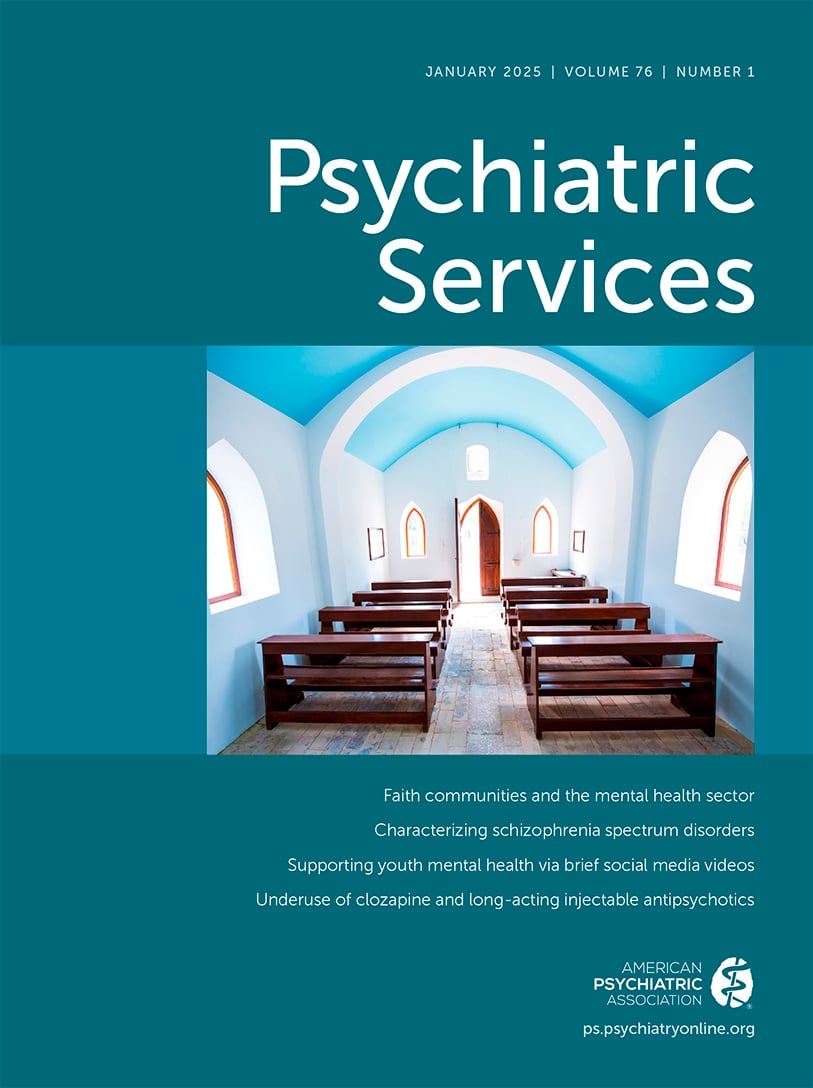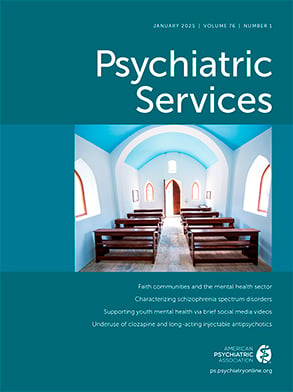Perez et al. (
1) conducted a rigorous scoping review to assess the characteristics and evidence base of partnerships between faith communities and the mental health sector. “Faith community” is broadly defined to include faith leaders (e.g., priests, imams, rabbis, and other clergy) and lay leaders or groups (e.g., volunteers and ministries) who are affiliated with a congregation (e.g., in a church, mosque, or synagogue) or other religious organization (e.g., seminary) across any denomination or nondenominational faith. Perez et al. cite that despite a slight decline in religiosity across the United States, about 80% of adults report a religious affiliation, 69% report attending religious services at least once a month, and 77% state that religion is an important part of daily life. Thus, the review has implications for population-based mental health initiatives and for promoting mental health equity among groups who face structural barriers to traditional psychiatric services.
The broad definition of faith community enhances generalizability across the 32 partnerships included in this review. Most partnerships involved Black or African American groups. Overall, the review provides support for initiatives from faith community–mental health sector partnerships in three broad categories: engage and build the capacity of faith communities to facilitate mental health education and early detection of mental disorders, shape social norms and stigma regarding mental health treatment, and establish linkages to mental health care. A notable limitation is that most of the reviewed studies were pilot studies and all had weak experimental designs, except for two randomized controlled trials.
A strength of the review is its reporting on partnerships involving Latino, Asian, and Muslim populations. These groups experience high levels of mental health disparities and unique challenges to receiving mental health treatment, such as stigma, cultural beliefs about treatment, and limited access to culturally competent providers. Geopolitical factors (e.g., increased discrimination toward Asian Americans during the COVID-19 pandemic), socioeconomic inequities, and barriers to care that raise risk of psychiatric symptoms should be included in frameworks that evaluate future partnerships. Community-partnered participatory research—which emphasizes power sharing, respect for diversity, and trust—may be a promising approach to engage these groups in more rigorous study designs.
Future studies with middle-aged and older adults, a group with more stable levels of religiosity, appear more feasible. For this group and the field generally, several questions emerge. How could faith community–mental health partnerships be used to address social isolation, which has been declared a public health crisis? Can mental health clinics and service providers affiliated with faith communities be formally converted into certified community behavioral health clinics to enhance sustainability and access to both mental health and substance use services? Can the expertise of clinicians who belong to faith communities be centered on conducting faith-affirming mental health interventions? How can pathways be created to sustain a more diverse (race, sexual orientation, gender identity, faith traditions) mental health provider pool? What are viable funding strategies for long-term faith community–mental health partnerships? What are the organizational factors that facilitate or impede uptake of mental health interventions? What are the conditions under which mental health interventions in faith communities should be brought to scale or discontinued?
Declining religiosity among young adults must be addressed if faith community–mental health partnerships are to be sustained long term. Indeed, none of the 32 partnerships focused on this population. Young adults may perceive some faith communities to be harmful or antagonistic toward LGBTQ+ people, those with mental health conditions, and other areas of society that they deem important. Engaging young people directly with participatory-action methods and leveraging principles of patient-centered care seem critical for success.
Despite these challenges, faith community–mental health partnerships are likely to continue to reach groups that would otherwise not seek formal psychiatric services. Identifying how these partnerships can be leveraged to train paraprofessionals (e.g., community health workers and certified peer specialists) affiliated with faith communities could help address the U.S. mental health workforce shortage. Rigorous assessment of the effectiveness of these partnerships on stigma, clinical symptoms, and community health metrics (i.e., psychiatric emergency room visits) is critical.

